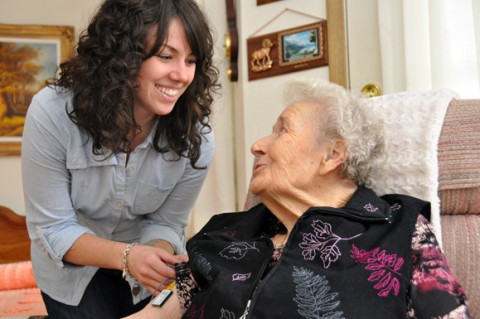
UBC Okanagan PhD student Kaitlyn Roland works with 91-year-old Elaine Newsham on a research initiative that aims to develop more objective ways to diagnose and treat frailty.
Kaitlyn Roland, a PhD student at UBC Okanagan studying the development of “frailty” in older adults, has been invited by the provincial government to present her research to key government officials at a student-led research symposium in Victoria on Mar. 8.
The symposium brings together top students who have produced impressive and policy-relevant research in the field of social policy. Roland’s work explores community therapists’ experiences of “frailty” with the goal of developing a subsequent theory of “frailty” from their perspectives.
More than 50 per cent of community-dwelling older adults have pre-frailty symptoms and 20 per cent are considered to be frail. However, it is often difficult to determine an older adult’s stage along the frailty continuum until it is too late.
“Specifically, we wanted to know how community therapists perceive frailty, how they measure frailty and how they deal with frailty,” says Roland, who is working under the guidance of UBC Okanagan Human Kinetics professors Gareth Jones and Jennifer Jakobi. “It is a very complex concept that is often diagnosed solely on subjective perception rather than applying any sort of objective measure.
“Ultimately we want to develop a more objective assessment method to diagnose and treat frailty.”
In partnership with Interior Health, Roland interviewed 11 physical therapists and occupational therapists — who often work with clients at a stage where they turn from pre-frail (borderline frailty) to frail — about their concepts and perceptions of frailty.
“Interviews demonstrated that therapists recognize frailty as deterioration in functional ability to complete daily activities, and an inability to thrive leading to a decrease in independence,” says Roland. “Therapists also expressed a need to learn more about frailty as a concept in itself, especially identifying pre-frailty in the community and means of prevention.”
The 11 therapists each gave Roland three names of older women they worked with whom they considered to be frail, not frail, or pre-frail. Jones, Jakobi and Roland then looked at the muscle activity of the older female adults for an indication of how much their muscles work during a day.
“By looking at the specific levels of muscle activity we can better discriminate between stages of frailty along the frailty spectrum,” says Roland, who is now in the data analysis stage of the project.
“Kaitlyn has been given the opportunity to inform B.C. government representatives about our research and its potential contribution to government health care policy,” says Jones. “Frailty appears to be a valid syndrome and is often diagnosed solely by recognition; however, its discrete clinical definition remains unclear.”
Ideally, says Jones, an objective measure of frailty will be developed — one that can be reproduced clinically and that encompasses the frailty spectrum, allowing frailty to be identified and treated early.
“That will help inform policy makers and health care professionals about reducing the health impact on an aging population.”
— 30 —